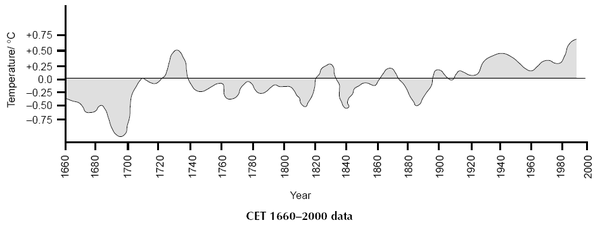The greenhouse effect and global warming
| Experiments related to climate change |
|---|
| Experiments on: |
| For teachers |
| For students |
| For technicians |
A garden greenhouse keeps plants warmer than they would be outside. It does this because the glass traps some of the Sun’s radiation energy. The atmosphere keeps the Earth warm in a similar way. Without the greenhouse effect the earth would be about 33 °C cooler than today’s pleasant average of 15 °C. Greenhouse gases include carbon dioxide, oxides of nitrogen, methane, chlorofluorocarbons (CFCs) and water.
- Questions
- If the greenhouse effect did not exist, what would the normal temperature of the earth be?
- What do you think is meant by global warming?
- List all the things you can think of that give off greenhouse gases – e.g., cars.
Contents
Looking at the data
Temperature changes over the last century
Study the graphs, published by the International Panel of Climate Change (IPCC) and then answer the questions. These are temperatures above and below the average for the period 1961–1990.
- 1980–2000 data

|
| Global average temperatures for 1980-2000 |
- Describe how the temperature of the earth has changed over the period 1980-2000.
- By how much has the temperature changed in that period?
- Draw a sketch graph to show what you expect the average temperature to change by over the twenty years from 2000–2020.

|

|
| Global average temperatures for 1940-1960 | Global average temperatures for 1960-1980 |
- 4. Compare how the temperature of the earth changed between 1960 and 1980 and between 1940 and 1960.
- 5. Based on the new information from question 4, draw a second sketch graph to show what you expect the temperature to change by over the twenty years, 2000–2020.

|

|
| Global average temperatures for 1900-1920 | Global average temperatures for 1920-1940 |
- 6. Compare how the temperature of the earth changed between 1920 and 1940 and between 1900 and 1920.
- 7. Based on the new information from question 6, draw a third sketch graph to show what you expect the
temperature to change by over the twenty years 2000–2020.
- 8. Has the overall temperature of the earth increased over the last century? (Use the data above to support your
answer.)
- 9. Based on the temperature changes over the whole of the 20th century, which of your sketch graphs is most likely
to be correct?
- 10. Do you think that you have enough evidence to support a firm conclusion to your answer to question 9?
When looking for answers scientist usually analyse data from more than one source if they can. The following graph comes from the Central England Temperature (CET) record. This record goes back to 1660 when instruments were first used to record temperatures. Annual temperatures are recorded here.

|
| Central England temperatures for 1900-2000 |
- 11. Does the Central England Temperature Record show the same temperature pattern as the IPCC data above?
- 12. How does the overall temperature change compare to the answer you gave in question 8?
- 13. Suggest a reason why different data collected during different experiments might vary, leading to uncertain conclusions.
For more information see the USAEPA website, which (as of September 2010) includes a global temperature graph for 1880-2008.
Looking at the data – temperature changes over several centuries
Study the graphs, from the Central England Temperature record (CET) and then answer the questions.

|

|
| Central England temperatures for 1800-1900 | Central England temperatures for 1900-2000 |
1. Do you think that the temperature changes seen in the 19th century were any different to those seen in the 20th century?
2. Which century was the coldest?
You may have seen pictures of people ice skating on the river Thames. At the same time, other places in Europe were also suffering from long bitterly cold winters and cold wet summers. This cooler period is often known as the ‘Little Ice Age’.
[[
|
| Central England temperatures for 1660-2000 |
3. When do you think the end of the Little Ice Age was?
4. After the Little Ice Age, how long did it take to warm up?
5. Compare the temperatures of the 1730s and 1740s with the present temperature.
6. How do these values compare to the temperature in the 1930s?
7. How do you think the temperature will vary over the next twenty years?
In groups of 3 or 4
8. Look back at the conclusions you came to about how you think the average temperature will change based on:
- the 1980–2000 data
- the 1940–1980 data
- the 1900–1940 data
- the 1660–2000 data
Try and decide if any are correct.
9. What is your overall conclusion about global warming?
10. Have the data changed your views about global warming?
If you have time, go on to the extension sheet.

